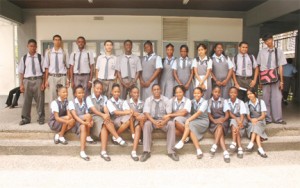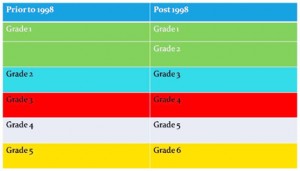This is the third in a series of articles provided by the CXC Secretariat for exclusive publication in the Guyana Review to mark the 30th anniversary of the CSEC examinations.
By Cleveland Sam
In every crown there is a prized jewel; and with the Caribbean Examinations Council, CXC, it is no different. The Council has a suite of qualifications – Caribbean Advanced Proficiency Examination (CAPE), Caribbean Secondary Education Certificate (CSEC), Caribbean Certificate of Secondary Level Competence and the Caribbean Vocational Qualification (CVQ). Without a doubt, however, the flagship examination for CXC is the CSEC – the jewel in CXC’s crown.

Indeed it could be argued that CSEC was the raison d’être for the Caribbean Examinations Council. At the January 1964 Conference of Governments of Commonwealth Caribbean countries held in Jamaica, Heads adopted the following resolution: “That the setting up of a Caribbean Examinations Council was a fit and proper subject for regional cooperation and that a working party should be set up to work out plans for the institution of a new system of Secondary School Examinations under the aegis of the Conference.”
Following numerous meetings, Heads of Government Conferences and declarations, the Agreement Establishing the Council was finally signed in 1972, thus paving the way for the first meeting of the Council in early 1973.
Delivering the feature address at the Inaugural Meeting of CXC in January 1973, the late Right Honourable Errol Barrow, Prime Minister of Barbados, stated; “Teachers in secondary schools of the Caribbean area now teach Caribbean children in their classrooms; but other teachers in a country three thousand miles away set the policy for examinations and in fact examine and pass or fail these students. All of us here are products of that system. I do not condemn it. It has served us well. But the time has come for Caribbean members of the teaching profession to take over the full responsibilities for the complete education process.”
And the region’s educator answered Prime Minister Barrow’s call and stepped up to the challenge and CSEC was the result. The Council then established the first CSEC subject panels in 1975 to develop and review syllabuses, recommend methods of testing and receive suggestions and criticisms from educators and teachers around the region.
In 1976, the panels began submitting reports, recommendations and proposals. Syllabuses for the first five subjects were published in 1977, giving teachers and students two years to prepare for the first examinations in 1979.
Help from UK Boards
In order to ensure it got it right the first time, CXC established links with the experienced examination boards in the United Kingdom as well as the Education Testing Services, ETS in the United States. These partnerships proved invaluable as CXC was able to benefit from their vast experience in administering examinations.
According to the then Registrar, Wildred Beckles, with the help of Chief Examiners from the Cambridge Examination Syndicate, CXC was able to train a sufficient cadre of markers to mark the examinations in 1979. That training involved marking “live” GCE O’ Level scripts written by Caribbean students in the fifth form – CXC’s target age group.
But that assistance did not end there. Several CXC staffers went on training attachments and visits to the UK and Scottish examinations boards as well as to ETS to learn the rudiments of examination administration.
Beckles also recalled that the CXC secured the services of Caribbean and British Moderators to vet its question papers. “The Caribbean to ensure the relevance of the questions to the region, the British to ensure the quality of the examining processes and comparability with similar examinations at age 16 plus,” he writes in an article to be published in the May Issue of CXC The Caribbean Examiner magazine.
From doubt to acceptance
The initial doubts about the success or value of a Caribbean examination have long being put to rest. In 1978 when some students heard they were going to be the first cohort of candidates to write a new Caribbean examination, they were resistant and doubtful. One female student from the Class of 1979 commented “I did not see myself as a pioneer charting the course for future generations. I thought we were guinea pigs for CXC being used for the ‘trial run.’ This student was not alone. A student from an all-boys school wrote, “I was in all honesty not too enthused, in fact, my attitude was one of indifference. We were at best skeptical of the examinations and deemed it to be an experiment with us being the guinea pigs.”
As a result, a lot of the students in 1979 wrote both the CXC CSEC examinations and the O’Levels of the overseas boards, ‘just in case.’
However, today the student from the all-boys school admitted, “I wish to state unequivocally that I am extremely happy that my worst fear about the inaugural examinations was unfounded as evidenced by the fact that the Council has grown from strength to strength and 30 years after stands tall in the Caribbean landscape.”
Two of the region’s Chief Education Officers recalled the fears about the CSEC examinations. Yvonne Lewis, Chief Education Officer (Acting) in Trinidad and Tobago speaking to CXC Youtube site noted, “I remember when CXC was first started, there were a lot of questions and doubts, but now it is accepted worldwide.”
Dr Wendy Griffith-Watson, CEO in Barbados also had such recollections as a teacher at the time. “At first as you would imagine it was a rocky road, it took about five years, but now there is no question about its value,” Dr Griffith-Watson said in an interview for the CXC 30th Anniversary video documentary.
CSEC the gold standard
The CSEC examination is perhaps the only examination which affects every household in the English-speaking Caribbean at one time or another since 1979. The children of the CSEC Class of 1979 – those persons who wrote the first examinations, are now writing CSEC or have written it already. It has become the gold standard of secondary school accomplishment in the Caribbean. CSEC is the proverbial high school currency which secondary school graduates in the region ‘spend’ to enter the job market or tertiary education. It is the window to their world.
Every advertisement in the Caribbean for a job vacancy, be it in the government service, the private sector or security services, calls for a minimum of “CXC passes.” What they really mean is CSEC acceptable grades; that is, Grades I and II for candidates who wrote the examinations prior to 1998 and Grades I to III for candidates who wrote the examinations after 1998.
“Employees recognise CXC General Proficiency as their standard for providing employment for leavers,” stated Osmond Petty, Permanent Secretary in the Ministry of Education, St Kitts and Nevis, speaking in an interview in the CXC 30th Anniversary video documentary. “It is the acceptable qualifications for school-leavers. You state the requirements in terms of passes at CXC General Proficiency or its equivalence,” added Petty.
Philomene Alexander, CXC Local Registrar in the Ministry of Education in St Lucia said, “CSEC in St Lucia has done very well for our students and in fact for the Country as a whole.” Our students use CSEC as the basis for furthering their studies.”
In an interview for CXC’s Youtube site, Alexander added that CSEC has helped with the improved instructional level at schools in St Lucia. “We have had people who mark the exams and they come back to the country with a lot of experience that they pass on at the classroom level,” she explained.
Melicita Bovell, Deputy Chief Education Officer in the Ministry of Education in Guyana was both poetic and philosophical in her views about CXC and the CSEC examination. Bovell noted that while the region shares a common history, “CXC really fuses us into being a Caribbean people.”
“It has become a household name that has given people an identity as one with their fellow brothers and sisters of the Caribbean and this has happened for our students and teachers so I feel that CXC has been the glue for people in the Caribbean.”
Diversity of offering
Over the 30 years of the CSEC examinations, one of the features has been the diversity of the subject disciplines offered. From only offering English Language, Mathematics, Caribbean History, Geography and Integrated Science in 1979, CXC now offers 33 subjects at CSEC in various cognate groups.
Agriculture Science
► Agricultural Science (Double Award)
► Agricultural Science (Single Award)
Business Education
► Office Administration Principles of Accounts
► Economics
► Principles of Business Electronic Document Preparation and Management
Expressive Arts
► Visual Arts Music
► Theatre Arts Physical Education and Sport
Home Economics
► Clothing and Textiles Food and Nutrition
► Home Economics Management
Humanities
► Caribbean History English A
► English B Geography
► Religious Education Social Studies

Industrial Arts
► Technical Drawing
Industrial Technology
► Building Technology
◊ Option 1 – Woods
◊ Option 2 – Construction
► Electrical and Electronic Technology
► Mechanical Engineering Technology
Modern Languages
► French
► Spanish
Science and Mathematics
► Biology Chemistry
► Integrated Science Mathematics
► Physics Human and Social Biology
► Information Technology







